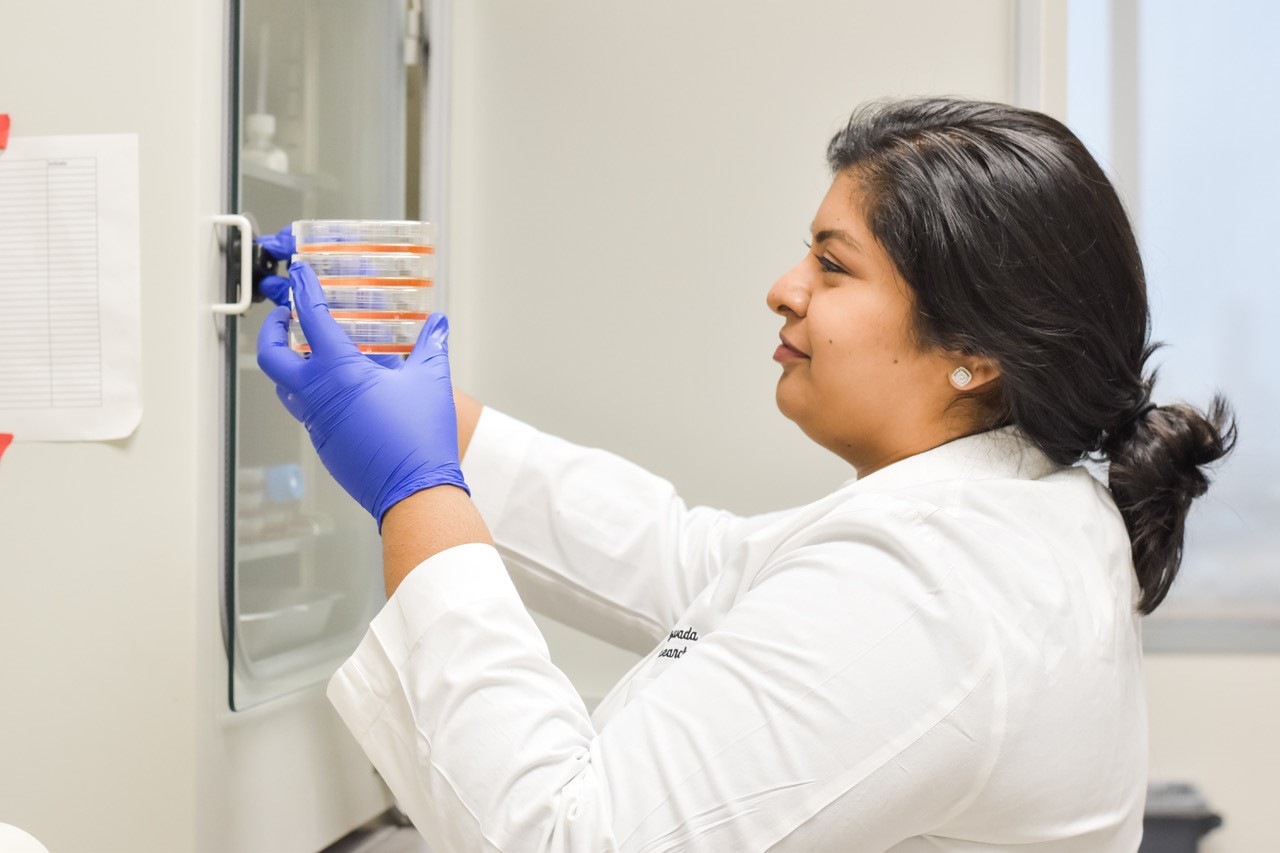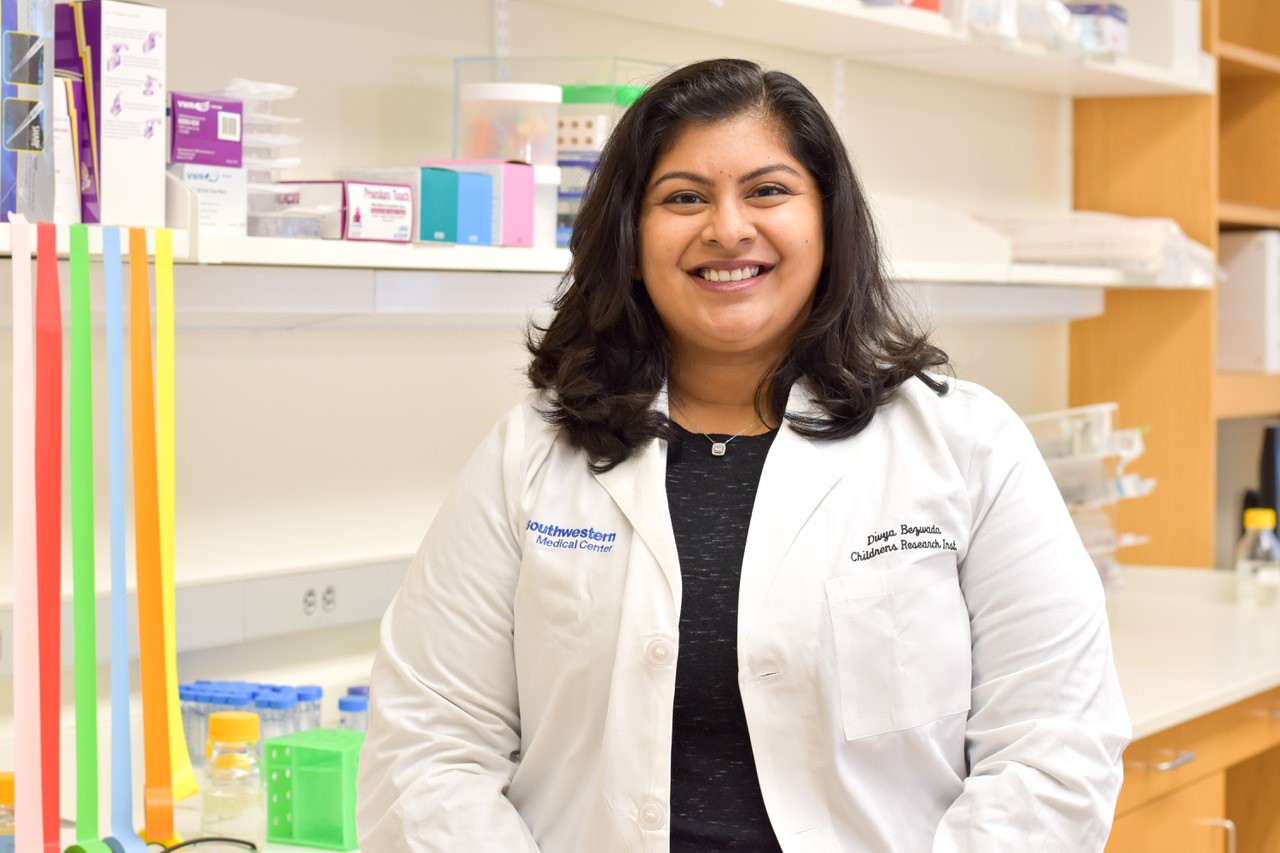Divya has gone above and beyond to establish a feeling of community among graduate students in the CRI and at UT Southwestern. She works very hard at the bench, performs the kind of research that spans multiple disciplines, and takes on leadership roles in the Graduate School that help make UT Southwestern such an exceptional place to train.
Ms. Bezwada’s mentor, Dr. Ralph DeBerardinis, a Professor at CRI, Chief of the Division of Pediatric Genetics and Metabolism at UTSW, and a Howard Hughes Medical Institute Investigator

In the DeBerardinis lab, Ms. Bezwada is leading a collaborative project to study kidney cancer directly in patients alongside an interdisciplinary team of surgeons, physicians, and nurses. She infuses stable isotope-labeled nutrients into patients during their surgery and then takes tumor samples back to the lab and uses cultured cell lines and mouse models to reveal how kidney cancers support their metabolic needs. Discovering the metabolic changes cancerous cells undergo has the potential to provide new therapeutic and diagnostic options for patients.
This work has already led to a co-first author paper in Cell Metabolism with Dr. Kevin Courtney, Associate Professor of Internal Medicine at UT Southwestern. The study revealed that clear cell renal cell carcinoma (ccRCC) tumors metabolize sugar differently than normal kidney tissues do or tumors in the brain and lung. As a result, ccRCC tumors may have metabolic dependencies that make them vulnerable to new types of therapies. ccRCC is the deadliest and most common form of kidney cancer — so identifying new therapies is an important clinical need. Keeping her work patient focused is important for Ms. Bezwada, which is why she sees patients weekly with her clinical mentor, Dr. Vitaly Margulis, Professor of Urology at UT Southwestern.
I am honored to receive the Ida M. Green Award. I am very fortunate to be supported by the UT Southwestern and CRI community. The science we do is a huge team effort and would not be possible without strong institutional support. I have also had exceptional mentors throughout my career and I try to pay that mentorship forward whenever I can.
Divya Bezwada
Besides a passion for her research, Ms. Bezwada is dedicated to providing the same mentorship experience she received throughout her career by being active in the graduate school community. Since joining the graduate program in 2016, she has helped organize multiple programs for student mentoring and leadership, particularly ones for women in science. This includes the Student Emerging Academy of Leaders (SEALS) program, a leadership development program for Mechanisms of Disease and Translational Science (MODTS) and NIH Predoctoral Trainees, and the Women in Science Mentoring Series. Ms. Bezwada is also the inaugural holder of the Kartik Rajagopalan Award, which recognizes trainees who best cultivate an atmosphere of collegiality and support at CRI.
It is a great honor for Southwestern Medical Foundation to present this year’s Ida Green Award to Ms. Bezwada. The depth of her leadership, research, and academic accomplishment is inspiring and representative of the pioneering spirit of innovation that Cecil and Ida Green represent.
Kathleen M. Gibson, President and CEO of Southwestern Medical Foundation
A native of Virginia, Ms. Bezwada received her undergraduate degrees in biology and chemistry from the University of Virginia and a master’s degree in biotechnology from Johns Hopkins University. She enrolled in the Graduate School at UT Southwestern in 2016 and joined CRI shortly after. Currently, Ms. Bezwada is working toward a Ph.D. in cancer biology, and is in the MODTS program, an honors graduate track designed to train Ph.D. students to become leaders of the next generation of translational scientists. She is also a Ruth L. Kirschstein National Research Service Predoctoral Fellow.
